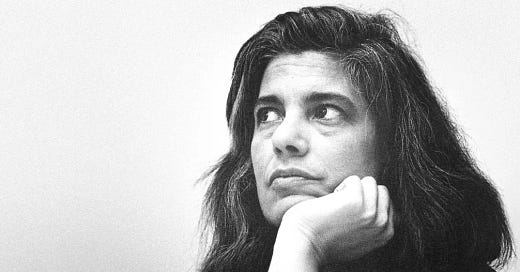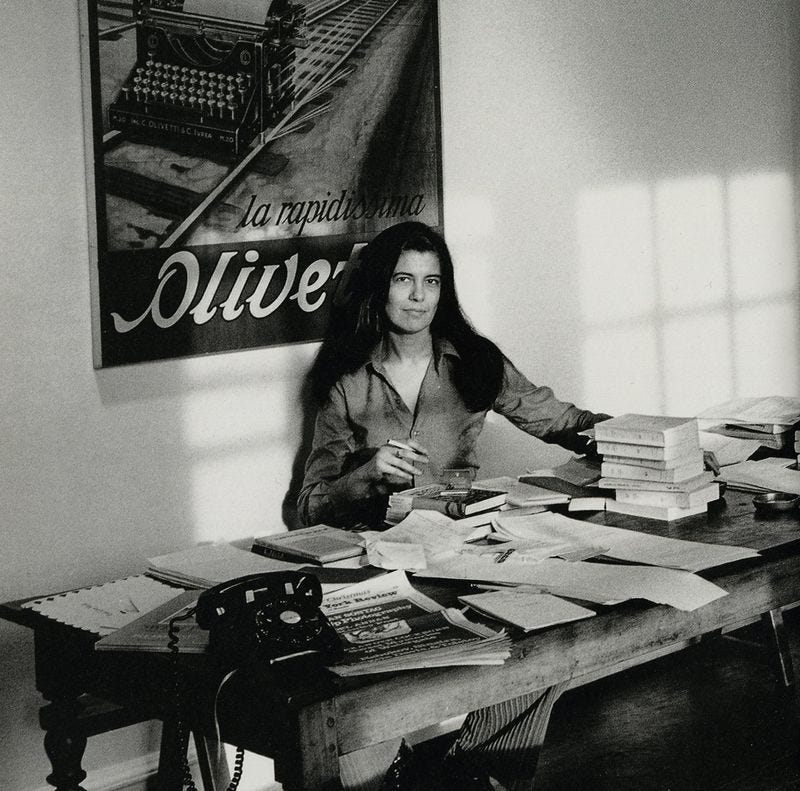Welcome to Mental Garden. The following letter is part of our "Notes on giants" collection, in which we explore the thoughts of humanity's greatest minds.
To see the full library, click here.
🏷️ Categories: Writing, Creativity, Habits.
Susan Sontag, one of the most influential voices in 20th-century literature.
I’m fascinated by her way of looking at the world, and I was captivated when I read her essays. Cultural critic, novelist, essayist, voracious reader. She had an obsessive relationship with writing—like all of us who love to write. I recently reread some notes I had about her, and, as always happens with authors who impact us deeply, I felt the need to get to know her more thoroughly.
I dove into her interviews, her journals, her reflections.
What I found was a treasure. On several occasions, she spoke about how she wrote and what ingredients were necessary to write well… and I inevitably asked myself: what can we learn from Susan Sontag to become better writers?
Here’s the answer.
1. Writing is not a hobby, it’s an obsession
“Writing is a kind of madness… You have to be obsessed. People write to me all the time, or contact me to ask: ‘What should I do to become a writer?’ I tell them: ‘Well, do you really want to be one? It’s not something you want to be, it’s something you can’t help being. You have to be obsessed.’”
— Susan Sontag, 92nd Street Y, 1992.
Writing is not a profession chosen rationally.
It’s not a decision one makes because it sounds appealing. For Sontag, writing is a compulsion, an uncontrollable need to put ideas on paper. The difference between someone who writes occasionally and a serious writer lies in that obsession: the inability to step away from words, the uncontrollable urge to write even if no one reads it. The ultimate expression of this drive is keeping a journal.
If not writing feels painful, that’s a good sign.
2. Be an observant person
“A writer, I believe, is someone who pays attention to the world. That means trying to understand, to assimilate, to connect with what humanity is capable of doing, and not be corrupted—not to become cynical or superficial—through this understanding.”
— Susan Sontag, speech in Germany, 2003.
Being a writer doesn’t just mean putting sentences together.
It’s, above all, a way of being in the world. For Sontag, writing requires full attention. A writer cannot afford to ignore the reality around them. They must observe, question, absorb everything. Literature doesn’t come from nothing—it comes from interaction with life, with the sublime and the terrible, with the best and worst of the world.
Only through this observant gaze does quality writing emerge.
3. Make prose an art
“I need what I read to interest me and move me. I can’t be interested in a book that doesn’t contribute to the project of wisdom. And I love elegant prose. To put it less pretentiously, my model for prose is poet’s prose; many of the writers I admire most were poets when they were young or could have been poets.”
— Susan Sontag, interview with The Paris Review.
Changing a word for a synonym isn’t a trivial act.
Sontag believed there’s far more to prose than just the ideas the sentences contain. Its musicality matters, its ability to evoke emotion, the way it’s presented. Two texts expressing the same idea can have radically different tones.
Do you sense a rhythm, voice, and structure in my prose?
Every writer has it—it’s part of personality and of the intent of the moment.
Just this idea is shared by Susan and Virginia Woolf: the rhythm of words.
For Sontag, excellence in writing comes from obsessive work on every sentence, from combining content with form. From thinking about what is said and how it is said.
4. Rewriting is essential
“I write with a felt-tip pen, or sometimes a pencil, on yellow or white notepads. I like the slowness of writing by hand. Then I type it up and make annotations on it. And I keep rewriting it, correcting both by hand and directly on the typewriter, until I can’t see how to improve it anymore.”
— Susan Sontag, The Paris Review interview.
Writing is not a one-time act—it’s a continuous process.
Sontag emphasized that the first version is never enough. Writing truly takes shape through rewriting: through revising, polishing, and questioning every word and structure. It’s a demanding and tedious process, but a necessary one.
Perfection is unattainable, but constant improvement is mandatory.
Patience and meticulousness are, therefore, essential traits of the serious writer.
5. Writing routine
“No, I don’t write every day. I write in bursts. I write when I have to, when the pressure builds and I feel confident enough that something has matured in my mind and I can put it down on paper.”
— Susan Sontag, The Paris Review interview.
The myth of the writer who sits down without fail every day isn’t quite true.
Sontag didn’t write every day, but she was prolific. She had bursts of intensity. That doesn’t mean discipline isn’t important, but depending on the genre you’re writing, creativity can be more chaotic and intensity more variable. Take advantage of your best days to write as much as possible, and use the bad days wisely: rest.
Creative blocks are inevitable, which is why knowing how to handle them is crucial.
As she says, “I write when something has matured in my head.” Don’t wait for the perfect idea—perfection is unreachable. You just need ideas developed enough to begin expressing them. If you feel blocked or the day isn’t good for writing, go do something else and let your mind wander.
It reminds me of Hemingway—when the words didn’t come, he stopped and did something else to clear his head. Write as much as you can, but not more.
If you’re blocked, rest and wander. It’s part of the process.
6. Read to write
“To begin writing, I read. Which is rarely related to what I’m writing or hoping to write. I read a lot of art history, architectural history, musicology, academic books on many topics. And poetry.”
— Susan Sontag, The Paris Review interview.
Writing is not an isolated act. Every writer is first and foremost a devoted reader.
Reading is a source of knowledge and a catalyst for writing. Reading broadly, exploring seemingly unrelated topics, and exposing yourself to different disciplines—all of this nourishes the creative writer’s mind. Ideas don’t come from nowhere; they are built from connections between what has been read, lived, and experienced.
To write well, you must first absorb varied and high-quality raw material.
7. To be inspired, do things
“Do things. Be intense, curious. Don’t wait for inspiration to strike.”
— Susan Sontag, commencement speech at Vassar College, 2003.
The romantic idea of inspiration as a sudden lightning bolt isn’t true.
Sontag understood that writing is the result of action, not waiting. Creativity is not passive—it requires movement, exploration, a willingness to engage with the world. We write best when we live intensely, when we accumulate experiences, when we allow ourselves to be guided by curiosity.
It’s not about sitting in front of a blank page waiting for inspiration.
It’s about going out into the world, acting, and provoking ideas. That’s what a serious writer does.
It’s a way of being in the world—of paying attention, of being obsessed with words, of reading endlessly, of rewriting relentlessly, and of accepting that inspiration is not a fickle muse, but the result of action.
If you want to be a writer, ask yourself whether you can withstand the obsession, maintain an observant attitude toward the world, and endure the endless effort this craft demands.
As Sontag would say, writing is not something you choose to be—it’s something you can’t help being.
✍️ Your turn: What other aspects are key to being a good writer?
💭 Quote of the day: ‘Attention is vitality. It connects you with others. It gives you enthusiasm. Keep up the enthusiasm.’ — Susan Sontag.
See you soon! Write in the meantime. 👋









Thank you for this wonderful article. Lots to think about and do.
Good suggestions here! Thank you!